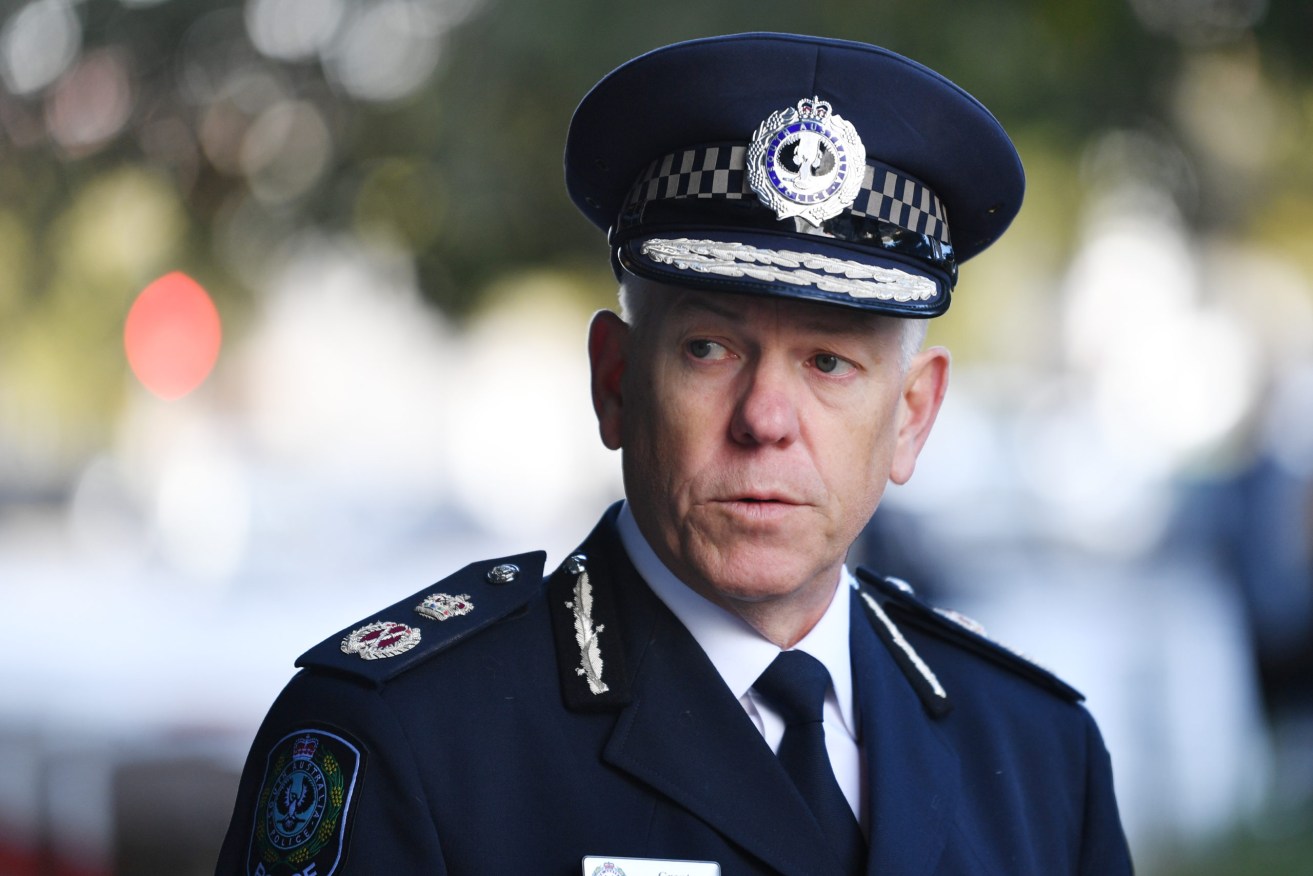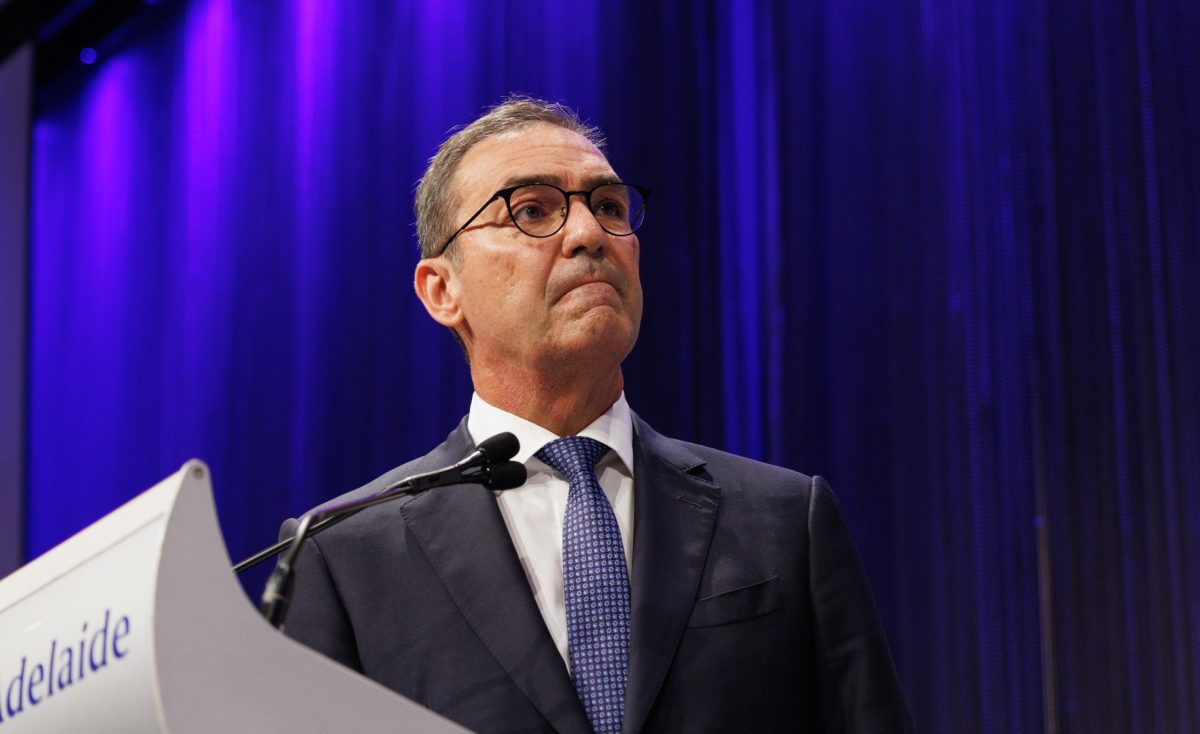COVID density caps, dancing and singing bans to end
All venue and home density caps will be removed, singing and dancing will be allowed and some COVID-positive cases will only have to quarantine for seven days under a raft of restrictions changes to come into effect from midnight Saturday.

State emergency coordinator Grant Stevens. Photo: David Mariuz/AAP
State emergency coordinator and SA Police Commissioner Grant Stevens announced the latest round of eased restrictions a short time ago, describing the changes as “much sought-after relief” for businesses and people across the state.
He said the state’s COVID-Ready reached a “high-level consensus” to ease a series of restrictions from one minute past midnight on Saturday March 12.
The changes include:
- The removal of all density limits, including for hospitality venues and home gatherings
- Allowing dancing and singing in public venues
- A reduction in the quarantine period for positive COVID-19 cases from 10 days down to seven days “for some people”
- The removal of the requirement to use QR codes in recreational and public transport, taxis and ride-share, auctions or inspections for properties that are for sale or rent, and education facilities
Stevens said SA Health would make direct contact with positive COVID-19 cases who are currently isolating to provide advice on whether they can leave quarantine early.
He said infectious people who have co-morbidities may still be required to quarantine for 10 days.
The state’s COVID-Ready committee will meet next week to determine whether to reduce the quarantine period for close contacts of positive cases down from the current 14 days.
It will also discuss whether to change mask-wearing rules in indoor public places.
The restrictions changes come as COVID-19 case numbers continue to climb following the return of school and the festival season, with the state today recording another 2590 new infections – the highest number since January 21.
Another four people – a man in his 50s, a man in his 80s, a woman in her 50s and a woman in her 70s – also died after testing positive for COVID-19.
There are 91 people with COVID-19 in hospital, including 11 people in ICU, and two people requiring a ventilator.
Asked why authorities were easing restrictions given the recent spike in COVID-19 cases, Stevens said: “We always expected that we would see fluctuations in the daily case numbers”.
“The critical indicator for us is the number of people being hospitalised on a daily basis and that has reduced substantially.
“It remains low and consistent, which is a strong indicator that the system’s able to cope, regardless of the number of positive cases.”
Stevens said authorities discussed the impact of Mad March festivities on easing restrictions and decided to “tread carefully” with regards to easing close contact quarantine and mask rules.
He said mask wearing remained mandatory in public indoor places and it was “always a possibility” that authorities could reintroduce restrictions.
“It is good to be able to stand here and provide this much sought-after relief to a wide range of activities across South Australia, including hospitality,” he said.
“I certainly understand the pressures that a whole range of sectors have been under because of the restrictions in South Australia.
“I’d just like to acknowledge the fact that – not withstanding the frustration and the impact it’s had – the high level of compliance we’ve had and the tolerance of the South Australian community for enduring what’s been an incredibly difficult two years.”
Govt ‘could’ve lifted some of those restrictions earlier’: Marshall

Premier Steven Marshall at Thursday’s SA Press Club leaders debate. Photo: Tony Lewis/InDaily
Earlier this afternoon, Premier Steven Marshall conceded that his government had made mistakes during its handling of the COVID-19 pandemic, citing the rate at which the state lifted its restrictions as one of those errors.
He said most people would appreciate that South Australia had performed comparatively better than the other states, but “around the edges, around the margins there are things that in retrospect you would change about the way that is has been administered”.
“I think that in retrospect you could’ve lifted some of those restrictions earlier, but of course, because there is a lag, it’s very difficult to tell it upfront – you’re working with models” he said.
“Definitely I’m not saying that everything has been perfect, but we’re very proud about what we’ve been able to achieve working with the people of South Australia, working with SAPOL, working with SA Health.”
The comments were in response to a question asked by Opposition Leader Peter Malinauskas during a SA Press Club leaders’ debate.
Asked if he shared Marshall’s view, Stevens said: “I won’t comment specifically on that”.
“What I will say is that… responding to a pandemic is a dynamic and ever-changing situation,” he said.
“There’s an immense amount of pressure to take swift action and put restrictions in place to ensure the safety of the South Australian community.
“The lifting of those restrictions is done in a considered way.”




